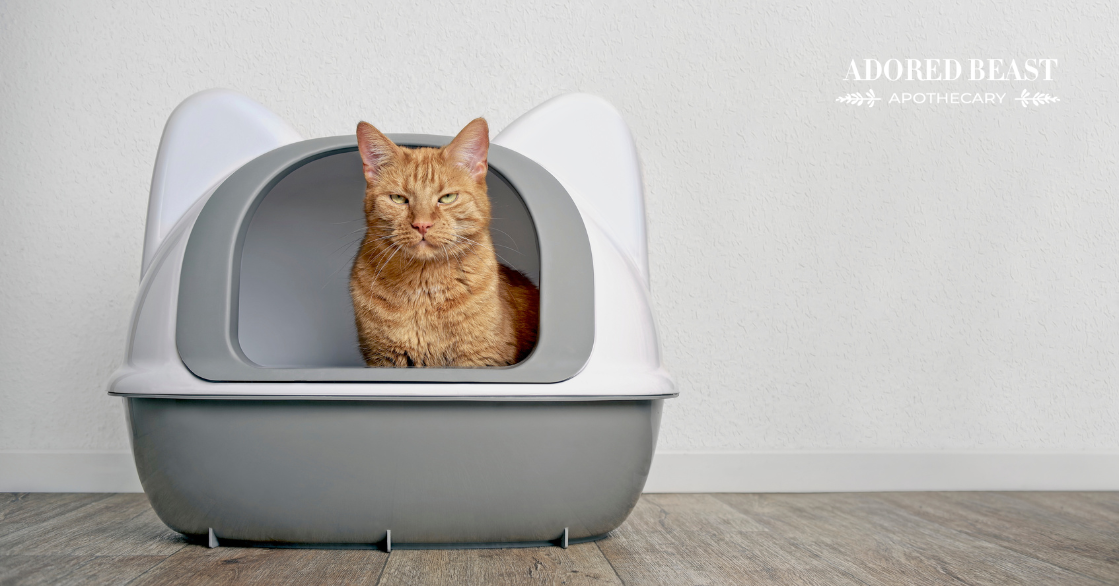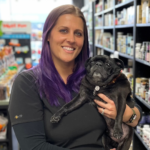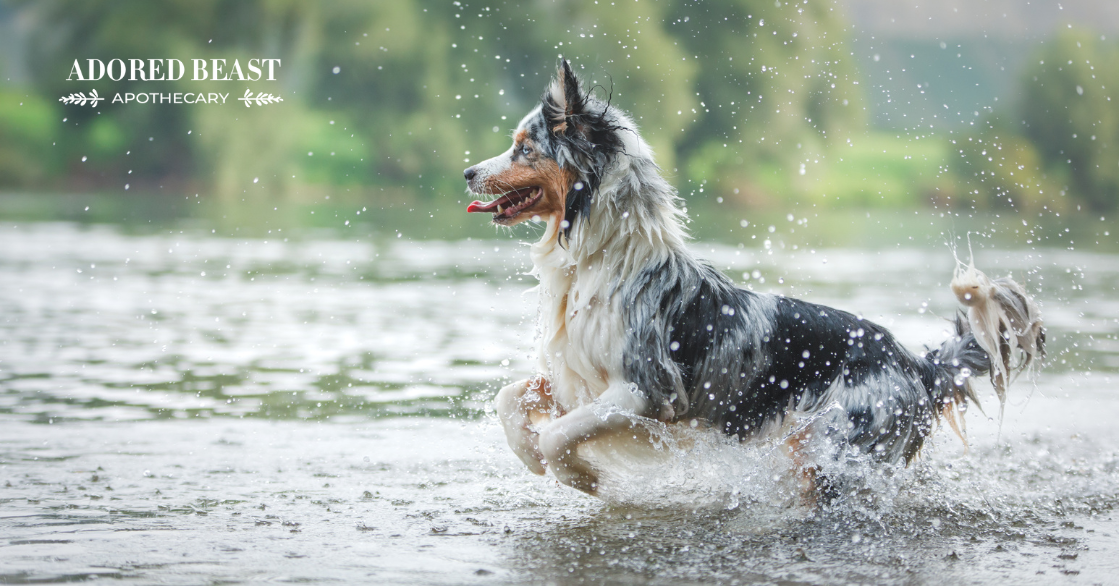When you notice your cat struggling and straining to poop, alarm bells will likely start ringing. It’s never a comforting thing to see that things are not moving as smoothly as they should.
Unfortunately, feline constipation is a relatively common issue, so let’s explore this problem and what can cause it, as well as explore the many ways you can help prevent or manage it if things start to “back” up.
Feline Constipation
If you’re unfamiliar with the condition, constipation is a difficulty having a bowel movement. Straining, crying out, and even blood in the stool might be present if your cat is struggling to go #2.
The causes of feline constipation can be many:
1. Dehydration
The most common cause of constipation is dehydration, which causes a host of issues, but constipation may be the most obvious sign. The colon’s primary function is to absorb water from the stool. If there isn’t enough water in the diet, stools will have very little water. The body will take every bit it can get, leaving the remaining stool extremely hard in consistency, and this consistency will make passing stool very difficult.
2. Musculoskeletal Problems or Pain
If a cat has arthritis or a nervous system disease associated with chronic pain, passing stool may also be very painful. With this type of constipation, you will likely hear vocalizing pain (crying out while trying to defecate). If there is a malfunction in the nervous system, muscular contractions may be more difficult as well, making bowel movements much more difficult and resulting in straining.
3. Diet
A diet too low in fiber is often a cause of constipation. Many commercial cat foods contain meager amounts of soluble fiber, which helps gut motility and stool size (makes stools bulkier and easier to pass). Fiber also lowers inflammation, so if the diet is lacking, it can also create systemic problems.
4. Obstruction
If your cat eats something they shouldn’t, this can result in an obstruction and an inability to pass stool due to a foreign object being in the way. Cats are known for their appetite for strange objects like hair ties, charging cables, and plastic pieces like milk gallon rings. So, if you have a cat that has a palette for odd items (PICA is the medical term for eating non-food items), be mindful of their litterbox habits so that you can catch a problem quicker.
5. Irritable Bowel Disease/IBD
IBD is a commonly diagnosed condition in cats (usually due to a poor diet) that results in systemic inflammation of the GI tract or can be localized to one region of the GI tract. This chronic inflammation will work threefold: an altered gut microbiome, painful contraction of the GI muscles, and enlargement of the GI tract, making bowel movements difficult to pass and painful.
6. Megacolon
This condition happens when the colon becomes inflamed, enlarges beyond normal limits, and does not contract properly. This results in stool becoming too large to pass out the rectum properly. This disease can be caused by chronic constipation, spinal cord or pelvic injury, or it may be idiopathic (unknown cause). The most common cause is chronic constipation. This condition is painful and requires regular veterinary intervention, so tackling chronic constipation is vital to avoid irreversible, costly, and painful consequences.
7. Excessive Grooming
When cats groom themselves excessively, this results in more hair in the GI tract than usual, and that hair will create a very dry, hard stool. While fur is normal for dogs and cats to consume, too much can result in difficulty passing stool, so limiting the amount of fur in the diet and the amount of grooming is essential. Most excessive grooming in cats is a result of stress, so start by limiting stressors or having your holistic veterinarian help you identify stressors you may not have realized.
8. Kidney Disease
Kidney disease causes multiple subsequent issues in cats, constipation being one of them. When the kidneys are stressed, they pull water from the body to dilute toxins so that the kidneys don’t have to work as hard. This results in dehydration, which results in constipation. Ensuring your cat with kidney disease is well hydrated (usually administering subcutaneous fluids regularly will significantly help) is critical to avoiding secondary disease symptoms like constipation.
9. Medications
Many commonly administered medications can cause constipation in cats, such as:
- Opioids – Opioids can cause constipation in cats by decreasing colonic propulsion, increasing water absorption and sphincter tone, and delaying gastrointestinal transit by inhibiting acetylcholine release
- NSAIDs – NSAIDs slow gastric movements, and cats do not metabolize most NSAIDs well and they can be toxic
- Diuretics – Diuretics that may be used for diseases like heart disease cause flushing of fluids out of the body, leaving very little in the stool and thus causing constipation
- Antidepressants – Antidepressants can cause constipation in a variety of ways, usually by slowing the movement of the digestive tract by blocking a chemical vital for nerve function in the digestive tract or by altering the gut microbiome
- Antihistamines – Similar to antidepressants, antihistamines can change or block the movement of muscles in the digestive tract, thus causing constipation
Conventional Management of Feline Constipation
Conventional veterinarians will use a standard set of tools to manage feline constipation:
- Laxatives – While laxatives may seem harmless in the short term, they are synthetic chemical mixtures, often unnecessarily containing preservatives and dyes, that cause other health issues such as diarrhea, cramping, leaking, vomiting, gas, or even obstruction (psyllium husk can cause this).
- Enemas – Besides the obvious stress of the procedure, enemas can cause acute electrolyte imbalances (which have a whole host of other secondary effects), rectal trauma, microbiome damage/loss, and some enemas have been known to cause toxicity in cats, depending on the mixture used.
- GI motility drugs – like metoclopramide (Reglan, Maxolon) or cisapride (Propulsid), are stimulants to specific parts of the GI tract. These drugs can cause various GI discomforts such as vomiting, diarrhea, or cramping since they override the normal motility of the digestive system.
Holistic Prevention and Management
Taking a holistic approach to your feline’s health care means aiming to prevent problems before they arise. So, what supplements are there to help keep your cat going smoothly?
Herbs and Nutraceuticals:
- Slippery elm bark – A soothing herb that can help lubricate the digestive tract and ease bowel movements. Slippery elm also contains nutrient benefits like trace minerals vitamins like B, C, and K. This herb can be safely used long term if needed. Slippery elm is a must-have for any pet owner to keep on hand.
- L-Glutamine – L-Glutamine helps support a healthy gut microbiome, strengthens the mucosal lining of the stomach and intestines, and protects the gut from inflammatory aggravations. It’s also a bonus supporter of the respiratory system.
- Larch Arabinoglactin – Prebiotics are critical to gut health since they are the food for gut bacteria and a superior choice for a prebiotic. Larch Arabinoglactin is anti-inflammatory, helps stimulate the immune system, and blocks tumor cells!
- Deglycyrrhizinated Licorice Root (DGL) – Slightly different than standard licorice root, DGL is a safer version of the herb that is safer for acute and long-term use. An ancient remedy used for hundreds of years, DGL supports healthy gastric mucosa by improving circulation and supporting new mucosal cell growth to create a healthier protective layer in the gut.
- Marshmallow Root – Similar to slippery elm, marshmallow is a demulcent plant containing polysaccharide complexes called mucilage. Mucilage is a slimy protective complex that helps soothe the gut and protects against pathogens entering through the gut lining. Marshmallow helps support a normal inflammatory response, is an antioxidant, supports pulmonary health, and even helps regulate blood sugar!
- Probiotics – We discussed that a key to constipation is within the microbiome, so ensuring your cat has flourishing gut microbiota is essential for overall health and longevity, especially for preventing constipation. A healthy microbiome will make for a healthy immune system, inflammatory response, and smooth bowel movements.
*Our Feline Gut Soothe is a perfect blend of these key ingredients and is a great option for managing your cat’s constipation or almost any digestive problem.
Diet
Diet is the most critical part of preventing almost all health issues, including constipation. Cats are not meant in any fashion to consume ultra-processed food like kibble and even most canned food. Cats are biologically obligate carnivores, meaning they need the vast majority of their diet in the form of animal protein. Fillers commonly seen in processed cat foods, including grains, thickeners/gums, and legumes, are all inappropriate dietary options and will result in negative health outcomes. We recommend incorporating as many fresh/raw whole food options as possible. While cats do not need carbohydrates in their diet, giving them fiber is essential, as we mentioned, to support normal digestion, establish a healthy gut microbiome, and prevent constipation.
By being proactive, you can help keep feline constipation an uncommon issue in your household. Diet is critical to maintaining overall health and wellness, so that is the most important start. Complimenting the diet with supplements that support a healthy inflammatory response, protect the gut lining, and establish a flourishing microbiome will result in perfect digestive harmony for our feline friends.












